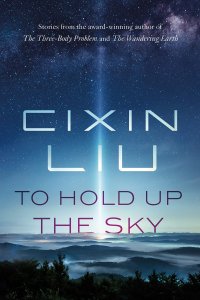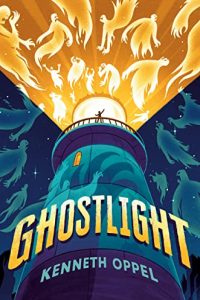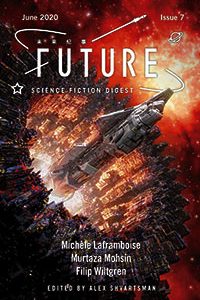Paul Di Filippo Reviews To Hold Up the Sky by Cixin Liu
 To Hold Up the Sky, Cixin Liu (Tor 978-1250306081, 336pp, $27.99, hardcover) October 2020.
To Hold Up the Sky, Cixin Liu (Tor 978-1250306081, 336pp, $27.99, hardcover) October 2020.
Cixin Liu’s first story collection in English continues to provide the same pleasures found in his award-winning novels: the simultaneous honoring and detournement of classic SF tropes, as filtered through a distinctly non-Western worldview and a quirky set of personal sensibilities. He is at once a radical and a conservative, an optimist and a pessimist, a member of the Old Guard and of the New Wave simultaneously. It’s a bracing mélange.
This volume gives us a chance to read Liu when handled by many different expert translators who are not named Ken Liu, a fellow who has ably shouldered more than his share of such duties. All kudos to them for some excellent renderings, every one of which seems miraculously to converge on what I presume is Liu’s actual voice. Also a plus: insofar as the copyright page can be trusted, only one of these tales, “Sea of Dreams”, has been generally available to English readers before now (in the pages of Asimov’s).
A stimulating introduction from Liu himself alerts us to his motives, methodologies, and messages. One of his stated intentions is “to imagine the relationship between Small people and Great universe,” the microscopic and the macroscopic. The first item, “The Village Teacher”, is a perfect fulfillment of this. It begins by chronicling the truly despairing and pathos-inducing life of a dedicated scholar and educator amidst the most abysmal circumstances of rural poverty and indifference. His dedication and drive and small achievements seem doomed to dissipate uselessly with his death. But then the POV switches to interstellar polities fighting a 20,000-year-old war, and that war’s intersection with Earth. Suddenly, unpredictably, the teacher’s sacrifices pay off. The story is Simakian in its deep moral simplicity and emotional impact.
Next up is “Time Migration”, which features that famous SF “power chord” from When the Sleeper Wakes: hibernation as a means of time travel. We watch our participants take vaster and vaster leaps across time, encountering freshly conceived Stapledonian vistas—“The ground was a crystalline plane as far as the eye could see. ‘All the land on Earth is covered in this material…’”—until finally they reach a tolerable and suitable destination. It’s an uncomplicated scenario, but pays off in layers of wonder.
“2018-04-01”, short yet potent, is almost cyberpunk in its depiction of a near-future where expensive longevity treatments, along with half a dozen other crazy trends, have created societal chaos. Our amoral, selfish hero is a perfect fit for the venue.
If George O. Smith and Lester del Rey had collaborated on a heavy-engineering story involving runaway destruction in a Chinese coal mine, the result might very well have resembled “Fire in the Earth”. Not as estranging or recondite as many of Liu’s other tales, the story benefits from his delving into the emotional life of the hubristic protagonist, whose coal-mining father looms like a specter over the son’s more intellectual life.
Despite its one-note gimmicky core, “Contraction” is an effectively mind-bending tale dealing with the unforeseen fallout from cosmological reversals of interstellar expansion.
The novum of an omniscient spacetime viewer, so brilliantly exfoliated by Damon Knight and Stephen Baxter among others, benefits from even further sophistications in “Mirror”. The concept of running a one-for-one model of the entire cosmos inside a super-computer is just one of Liu’s insightful twists. Basing the plot on corruption among Chinese officials adds a thematic punch, insofar as the viewer represents the attainment of absolute transparency—a power which proves as devastating as Knight envisioned.
Pass Spielberg’s Close Encounters of the Third Kind through a Greg Egan filter, and you might end up with “Ode to Joy”. Its great opening line sets up the microcosmic concerns: “The concert held to close the final session of the United Nations was a depressing one.” But almost immediately upon the establishment of these relatively trivial mortal matters, we are it with the arrival of a totally bizarre omnipotent alien intent on staging its own musical event. The resonant optimism is refreshing.
Just when we think we know all of Liu’s modes, we get “Full Spectrum Barrage Jamming”, as pure-quill an example of military SF as anything Pournelle or Drake might have written. A near-future high-tech war between the USA and Russia moves forward simultaneously, across the span of a few days, both at the foot soldier level, the high and mighty officers’ level, and also in the outer space arena, where thwarted noble solar system explorations counterpoint the terrestrial doings.
As in “Ode to Joy”, we discover in “Sea of Dreams” another art-minded alien invader. This fellow calls himself “a low-temperature artist,” and is intent on plundering Earth’s oceans as his medium. Our viewpoint character, Yan Dong, is an ice sculptor who serves as liaison to the creature, and who, in his aftermath, helps to repair the world.
“Oh, yes, humanity lived inside the Earth nowadays. To be more accurate, humanity lived inside the Air, for the Earth had become a gas balloon.” With this calm and startling declaration, Liu kicks off “Cloud of Poems”, which chronicles how the Devouring Empire—a race of star-faring dinosaurs—conquered our planet, only to be ultimately repelled by the power of poetry.
Finally comes “The Thinker”, which is a quirky, cosmically inclined love story reminiscent of the work of Peter Beagle or Robert Nathan. A young medical doctor becomes infatuated with a young astronomer whose quest to prove that lines of communication exist between suns (not the planets of the suns or the peoples thereof, but rather the suns themselves) comes to mirror the mortal romance—another yoking of high and low, resonant with the works of Gregory Benford.
If we strive to distinguish what make Cixin Liu’s fiction distinct from American and Anglo SF, we could point to a couple of things. A wider sense of community perhaps, whereby individuals matter less than groups. Consider the mass voyagers of “Time Migration”, as opposed to Wells’s solo sleeper. There’s also a notion of larger spans of history in play, perhaps because China is more ancient than the USA or even the UK. There’s also the belief that history is a succession of unpredictable catastrophes and partial, traumatic rebounds, not a straight line of unending progress.
But underneath any flavorful cultural trappings lies the essential core of a science fiction, identical to that found in SF from the West: engagement with the universe on the universe’s own terms of harsh and unrelenting physics, math and biology, without denying the specialness of homo sapiens and the human heart.
 While you are here, please take a moment to support Locus with a one-time or recurring donation. We rely on reader donations to keep the magazine and site going, and would like to keep the site paywall free, but WE NEED YOUR FINANCIAL SUPPORT to continue quality coverage of the science fiction and fantasy field.
While you are here, please take a moment to support Locus with a one-time or recurring donation. We rely on reader donations to keep the magazine and site going, and would like to keep the site paywall free, but WE NEED YOUR FINANCIAL SUPPORT to continue quality coverage of the science fiction and fantasy field.
©Locus Magazine. Copyrighted material may not be republished without permission of LSFF.








A lot of the stuff translated here has already been translated elsewhere, and in my view, the other translations are superior. “The Village Teacher” / “The Village Schoolteacher”, as well as “The Poetry Cloud”, are more effectively translated elsewhere.
TVS, for instance, is a “gimmick” of a short-story; its artistic impact consists in the contrast between the realism of an idealist who ends up dying for his beliefs and the “goofy” aliens in a galactic war.
The translation in “To Hold Up The Sky” tones down this contrast, which makes it harder to enjoy–the other translation, if you can find it, allows you to achieve a _Huckleberry Finn_ type effect wherein the entire joke is that the aliens are unrealistic and might as well be a fever dream of the dying idealist (the sugar on top of the bitter tale actually accentuates the bitterness of the story). In reality, it’s also a science fiction retelling of “The Old Man and the Mountain” idolized by the Maoists. In the coda to “Old Man”, the Gods (read: aliens in the Liu Cixin story) are moved by the persistence and dedication of the Old Man, and they move the mountain for him instead of him having to undertake a multigenerational project to get the damned mountain out of the way.
===
One of the big problems with the translation, in my view, is that it doesn’t understand the post-Modernity or the pre-post-Modernity (in the sense that postmodern techniques already exist in European, Islamic, and Chinese traditional literature) of Liu Cixin; i.e, Liu’s science fiction is often self-aware and doesn’t take itself too seriously.
Carmen Yiling Yan’s translation of Poetry Cloud, for instance, loses the sense of fun in the Wong Ip translation hosted on the CUHK server. Likewise, it makes the unpardonable mistake of not even attempting to translate the poetry sprinkled throughout the text, merely using phonetic renditions (and in Mandarin Chinese, not in reconstructed Middle Chinese, if you had to do that). And the Joel Martinsen translation of The Thinker on Paper Republic also feels “stronger” than the one by John Chu in To Hold Up The Sky.
===
Coincidentally, looking up the stories again, the most effective stories are the ones translated by Joel Martinsen, with the others likely being done by his disciples and students.
So all in all, the book is really ruined by uneven translations. It’s much better to get the stories that haven’t been translated elsewhere here, but resort to public translations of other texts in online. One final regret is that I had heard that “Angel Age”, a really problematic neo-Orientalist text (sub-Saharan Africans are genetically engineered into superior humans, and the West attempts to wipe them out for the “crime against humanity”) was translated “properly” in this text. As it turns out, it wasn’t included.